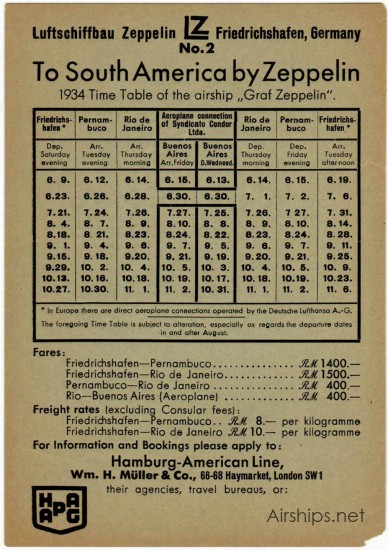Today is the anniversary of the world’s first airline. DELAG was established on November 16, 1909, and provided passenger service — including the world’s first transatlantic airline service — using zeppelin airships.
DELAG was an acronym for Deutsche Luftschiffahrts-Aktiengesellschaft, or German Airship Transportation Corporation Ltd.
While many of the flights before World War I were local sightseeing tours, the DELAG airship Bodensee began regular scheduled service between Berlin and southern Germany in 1919. The flight from Berlin to Friedrichshafen took 4-9 hours, compared to 18-24 hours by rail.
DELAG offered the world’s first transatlantic passenger airline service, using LZ-127 Graf Zeppelin to make regularly scheduled flights between Germany and South America beginning in 1931. Graf Zeppelin crossed the South Atlantic 136 times before being retired after the Hindenburg disaster in 1937.
DELAG also employed the world’s first flight attendant, Heinrich Kubis.
DELAG’s operations were taken over by the newly-formed Deutsche Zeppelin-Reederei in 1935.



Thanks for another great little chunk of LTA history. The Bodensee was a first in LTA design with its tear drop hull and purely civilian purpose. She paved the way for the Graf Zeppelin and later the Hindenburg class airships. It can happen again with another small airship like the… Read more »
If Heinrich Kubis was the world’s first flight attendant, then who would be the world’s first airline captain? Dr. Eckener? I have come across a caption of a photograph of the Schwaben in flight in Eckener’s book “My Zeppelins” (Im Zeppelin über Länder und Meere). The caption reads “The world’s… Read more »
I should think the crazy Count himself. He flew and piloted many of the early passenger airships before the Bodensee was built.
Dagmara Lizlovs November 18, 2014 at 9:44 pm Crazy or visionary? It is hard to tell the difference. Mozart was a bit quirky too. Isaac Newton dabbled in alchemy for a bit. Most inventors and geniuses were/are a bit crazy, but they’ve changed our world in ways we take for… Read more »